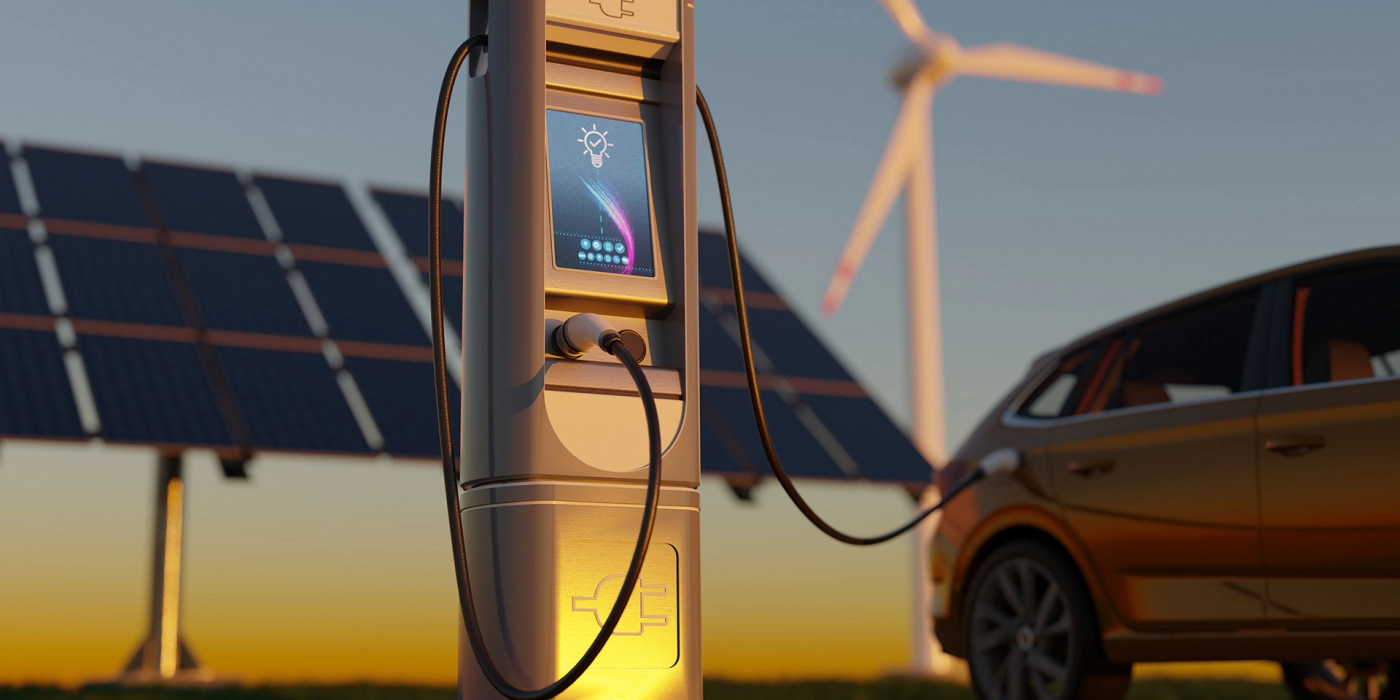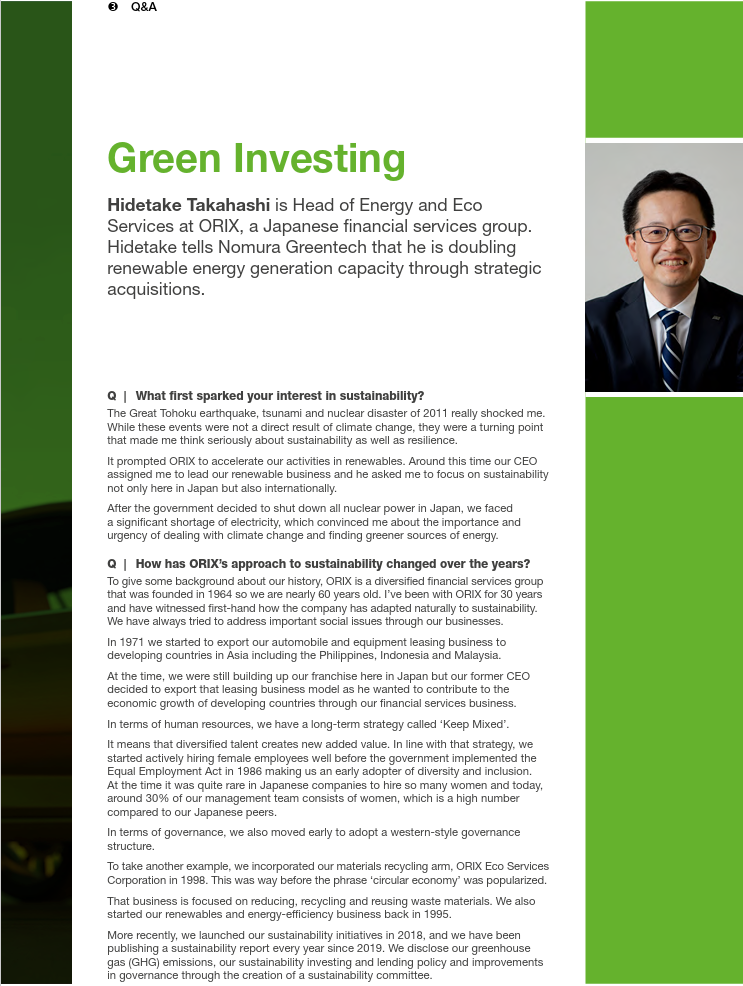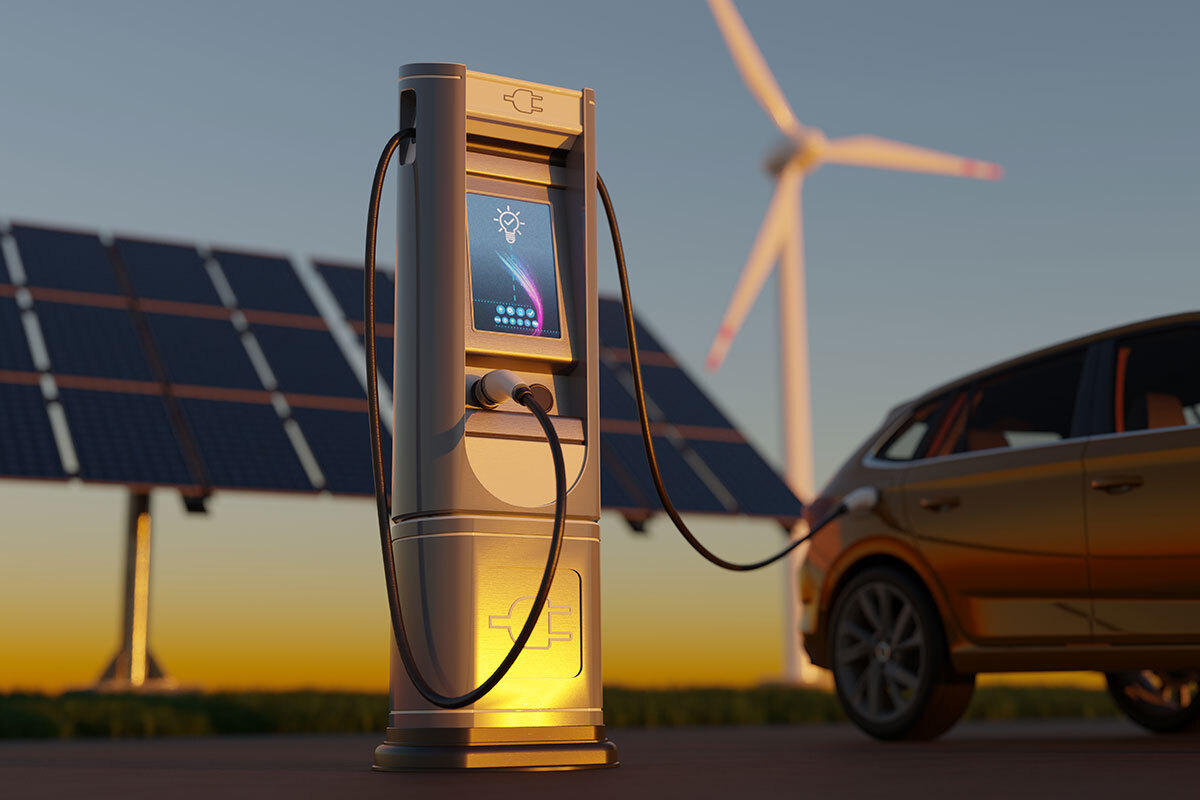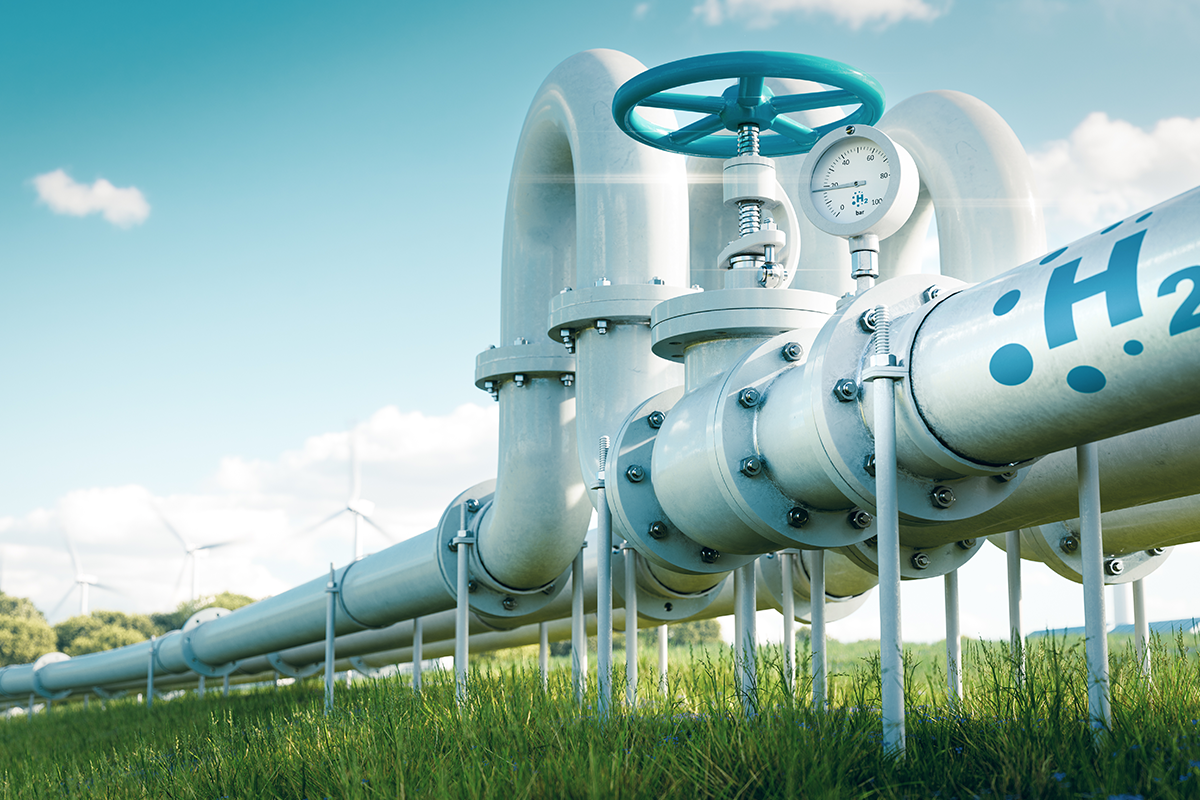-
ORIX has committed to reduce 50% of GHG emissions by 2030
-
Hidetake explains how ORIX implements a two-pronged approach to double renewable energy generation, using proprietary green field development and M&A
-
Resilient supply chains, new technology and private-public partnerships will be key drivers of the sustainability transition in Japan
What first sparked your interest in sustainability?
The Great Tohoku earthquake, tsunami and nuclear disaster of 2011 really shocked me. While these events were not a direct result of climate change, they were a turning point that made me think seriously about sustainability as well as resilience.
It prompted ORIX to accelerate our activities in renewables. Around this time our CEO assigned me to lead our renewable business and he asked me to focus on sustainability not only here in Japan but also internationally.
After the government decided to shut down all nuclear power in Japan, we faced a significant shortage of electricity, which convinced me about the importance and urgency of dealing with climate change and finding greener sources of energy.
How has ORIX’s approach to sustainability changed over the years?
To give some background about our history, ORIX is a diversified financial services group that was founded in 1964. I’ve been with ORIX for 30 years and have witnessed first-hand how the company has adapted naturally to sustainability. We have always tried to address important social issues through our businesses.
In 1971, our former CEO decided to export our automobile and equipment leasing business to developing countries in Asia including the Philippines, Indonesia and Malaysia. He wanted to contribute to the economic growth of developing countries through our financial services business.
In terms of human resources, we have a long-term strategy called ‘Keep Mixed’. It means that diversified talent creates new added value. In line with that strategy, we started actively hiring female employees well before the government implemented the Equal Employment Act in 1986 making us an early adopter of diversity and inclusion. Today, around 30% of our management team consists of women, which is a high number compared to our Japanese peers.
We also moved early to adopt a western-style governance structure.
To take another example, we incorporated our materials recycling arm, ORIX Eco Services Corporation in 1998. This was way before the phrase ‘circular economy’ was popularized.
More recently, we launched our sustainability initiatives in 2018, and we have been publishing a sustainability report every year since 2019. We disclose our greenhouse gas (GHG) emissions, our sustainability investing and lending policy and improvements in governance through the creation of a sustainability committee.
We also set material sustainability goals for the group that are supported by business-level goals and key performance indicators (KPI).
ORIX has committed to net zero emissions by 2030. Do you think companies need to bring forward these goals to 2040 as suggested recently by the UN Secretary-General?
We have two co-firing power stations that use coal and we also own and operate a waste treatment plant. These three facilities are our main sources of CO2 emissions so we need to think about converting coal to biomass, ammonia or hydrogen to meet our 2030 target.
You have an ambitious goal to double your renewable energy generation capacity from 3.3 gigawatts to 7 gigawatts by 2025. How will you achieve that target?
We buy new renewable development platforms, such as our project in Spain where we acquired a renewables company called Elawan Energy in 2021. Following the acquisition, we entered into new markets such as Greece, the UK, Germany and Italy. We have also been trying to expand Elawan’s business in the US.
While the gigawatt number is an important KPI to show our growth potential, what’s more important is to provide sustainable, reliable renewable power to our customers because solar and wind have intermittency challenges.
From that perspective, we have invested in one of the largest renewable platforms in India called Greenko Energy Holdings. The company is constructing and developing several very large pumping storage hydro plants. These will combine with solar and wind to provide round-the-clock renewable energy.
We also established an operation and maintenance company in Japan called ORIX Renewable Energy Management to maximize the performance of solar plants and extend the life of renewables plants. We use cutting edge AI technologies for proper operation and maintenance to achieve more megawatt hours.
This is an important pillar of our sustainability effort as longer plant life and higher performance produce more renewable power for a long duration.
What is the most challenging aspect of making your business more sustainable and why?
Earlier, I mentioned our “Keep Mixed” human resources policy and I think we need to pursue further diversity and inclusion especially here in Japan. The Japanese population is aging and decreasing but at ORIX we need to sustain our business through our workforce.
That means we need to retain and recruit the best talent. A comprehensive diversity and inclusion strategy can help us to create more innovative solutions for other social issues. It’s not just diversity of people but it’s also diversity of thinking.
What threats do you see to the sustainability transition in Japan?
One of the threats is industrial development. For too long, we have depended on imports of natural resources in traditional energy sectors including LNG and coal. And now during the transition period to renewables we are increasingly dependent on imports of major equipment like photovoltaic solar modules, wind turbines and battery storage.
I’m primarily talking about the manufacturing part of industrial development. My concern is that Japan used to be a pioneer in innovative technology but we’ve increasingly needed to depend on overseas companies.
On a more general note, for the sustainable transition to be successful, I think we need to see a better relationship between economic benefits and environmental and social responsibilities rather than the trade-off relationship that we have grown accustomed to. From this perspective, it is important that the effort comes from both the private sector and government.
What are the industries or sectors you’re most excited about for future investments?
Frankly speaking, I am still excited by the potential of renewables. Currently, they are mainly used for electricity but in future we will see deployment in industrial energy as well as transportation. Renewables are also required to produce green hydrogen, green ammonia and sustainable air fuel.
In Japan, we also have a long history of materials recycling and waste treatment. This industry is quite traditional in terms of digitalization, it’s very manual without much automation. So I see an enormous opportunity to make the industry more efficient.
And growing the materials recycling or waste treatment business will help to create a circular economy which is needed for decarbonization. The circular economy is relatively new and there are fewer competitors with more fragmented industries and markets, not only in Japan but also in many other countries.
Disclaimer
This content has been prepared by Nomura solely for information purposes, and is not an offer to buy or sell or provide (as the case may be) or a solicitation of an offer to buy or sell or enter into any agreement with respect to any security, product, service (including but not limited to investment advisory services) or investment. The opinions expressed in the content do not constitute investment advice and independent advice should be sought where appropriate.The content contains general information only and does not take into account the individual objectives, financial situation or needs of a person. All information, opinions and estimates expressed in the content are current as of the date of publication, are subject to change without notice, and may become outdated over time. To the extent that any materials or investment services on or referred to in the content are construed to be regulated activities under the local laws of any jurisdiction and are made available to persons resident in such jurisdiction, they shall only be made available through appropriately licenced Nomura entities in that jurisdiction or otherwise through Nomura entities that are exempt from applicable licensing and regulatory requirements in that jurisdiction. For more information please go to https://www.nomuraholdings.com/policy/terms.html.





